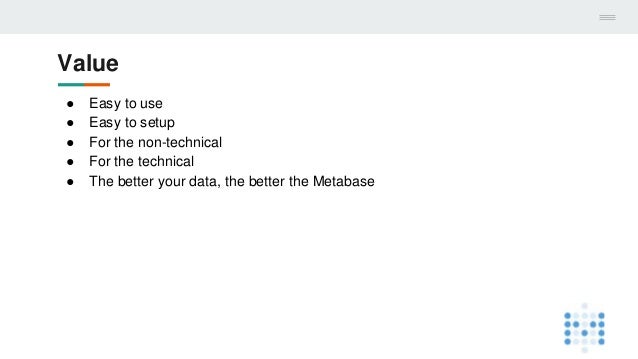I’ve been using metabase to rapidly prototype some business reporting at work, and recently had to do some faffing around with an audit log that contained JSON blobs. Initially I went down the path of dumping the data through a little Clojure ETL pipeline and out into an embedded SQLite database, but we needed timestamps, so it was time to work out how to get the JSON into shape.
Turns out the native query window, which allows you to save question output, can support querying of JSON blobs, as described on this thread and solved by user conanbatt.
This is nice, as for a simple use-case it means we don’t have to do any ad-hoc ETL or spin up any more services.
So, let’s assume that we have a JSON blob in the column json_field - we can unpack it as per the following example to grab the values of the hashmap keys 'location', 'type', and 'date'.
Using Metabase with an H2 application database is not recommended for production deployments. For production deployments, we highly recommend using Postgres, MySQL, or MariaDB instead. If you decide to continue to use H2, please be sure to back up the database file regularly. What Is Metabase? I would describe Metabase as a tool that can provide you a graphical interface to create business intelligence and analytics graphs in minutes. It does not require any previous SQL knowledge, and it has a nice interface where you can simply make analytics with just a few clicks.
From the top level of the row of data, all we’re interested in is the id field and the event_created_at timestamp field.
Put that in the New Question -> Native Query window of Metabase, and then click ‘Save’ to store the question. If you need results from the whole table, remove the LIMIT clause in the query above.

Metabase Postgresql Json
Bonus Points
Metabase Postgres
So, what if you need to validate those extra fields?
Metabase Postgres Docker-compose
Let’s say that 'location' and 'date' might be null - but that we want to exclude those rows if so. Finally, let’s imagine that for some reason the field of 'type' is sometimes set to a string value of 'null' inside the JSON blob and that we want to exclude those rows as well.
Metabase Postgres Version
Given those constraints, we can use the following:
I’m sure an SQL expert could make this better, but for my purposes it’s a nice little solution.
